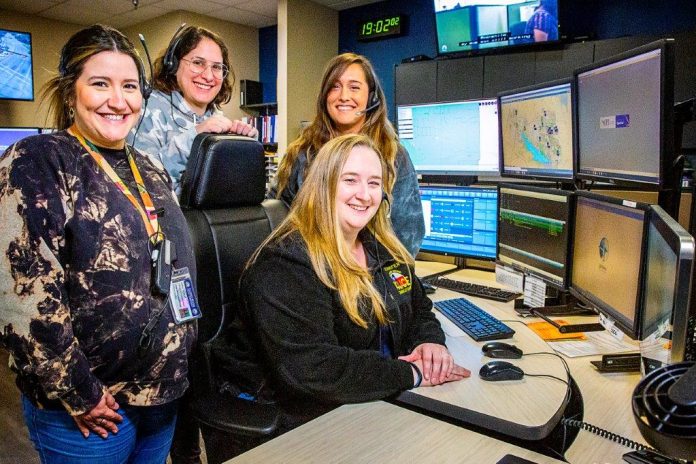The phrase has been heard countless times on television shows and in real life.
“9-1-1, what’s your emergency?”
Sure, the people who answer those calls handle life’s toughest moments. But it turns out places like the Flower Mound Police Department’s Telecommunications Center responds to more non-urgent calls than emergencies. While their work entails areas like fire, police, and medical, it also involves animal control, sewer, public works and water.
“We handle all those calls to the town after hours,” said Jennifer Arnold, shift supervisor for the First Battalion – those who work 6 p.m. until 6 a.m. Sunday, Monday and Tuesday and a half-day Wednesday. “If people have a water leak and they need their water turned off, we get the call and send someone out to take care of it.”
Calls from landlines show up on dispatchers’ screens at the address on that phone billing system. Wireless calls goes to nearest cell phone tower and are routed to the closest agency. When the nearest towers are busy, calls coming into Flower Mound can be from Lewisville, Grapevine, Highland Village, Argyle and Roanoke, and are transferred to the proper jurisdiction.
“The majority of what comes in are non-emergencies,” Arnold said. “We do get a lot of people calling for what we deem as non-emergency but to them it is an emergency so we treat it is as such.”
Among the oddest non-emergency calls are those asking for the hours for trick-or-treating at Halloween.
“It’s laughable now but it can be stressful at the time because it is tying up an emergency line when it’s not really an emergency,” Arnold said. “Everyone knows you are going to get help in some way when you dial 9-1-1. We’re always there but a lot of people don’t know what all we do behind the scenes.”
In 2021, the Flower Mound Telecommunications team processed 55,735 service calls which include officer-initiated information inquiries.
“We’re always here,” Arnold said. “We also dispatch the fire department to all kinds of things, fires, medical calls, alarms. Our responsibility is to the citizens, officers and the firefighters. That’s our No. 1 priority. We take care of them so they can go home at night.”
“We refer to this special group of professionals as the first, first responders,” said Gregory Ballentine, executive director of the Denco Area 9-1-1 District. Denco provides all Denton County law enforcement agencies except for Carrollton with training to qualify for telecommunications licenses, which Arnold said became required in 2014.
The district also provides telephone systems and mapping software paid for through a fee on cell phones. According to Ballentine, there are about 200 public safety telecommunicators working in the nine Denton County emergency communications centers.
“Denton County dispatchers are incredibly lucky that we have such an incredible support system from training to technology,” said Arnold, who has been in her current position for six of her 11 years on the team. “Not every county has that. Some rural counties don’t have the support we do.”
“Everyone is used to seeing the law enforcement, fire and EMS responders but nothing happens without these dedicated professionals behind the scenes,” Ballentine said. “They don’t always receive the recognition they deserve as an integral part of the public safety chain. With the evolution of technology and the specialized training received by area telecommunicators, they are responsible for lives saved each and every day in our area.”
Flower Mound will join departments across the country recognizing National Public Safety Telecommunications Week April 10-16. Since 1981 it has cited telecommunications personnel for their hard work. The FMPD provides staff with food and gifts each year to commemorate the occasion.
In 2019, the Texas House approved a bill reclassifying dispatchers as first responders. The state is among a growing number that recognize this while the federal government still considers them office and administrative support personnel.
Arnold and all her team members are CPR certified to provide medical guidance over the phone until first responders arrive. Some dispatchers have even helped deliver babies by telephone. They also enter warrants into the town’s database. Arnold also is the department’s lone member of the Texas TERT – Telecommunicator Emergency Response Team – whose members are deployed to help other areas as needed.
Right now the Flower Mound Communications Center has 11 people working in its division – 7 dispatchers and 4 shift supervisors- and is looking to hire four more dispatchers.
“Not everyone grows up wanting to be a 9-1-1 dispatcher. But these are the people who answer your phone calls,” Arnold said. “It’s very rewarding.”












.jpg)

